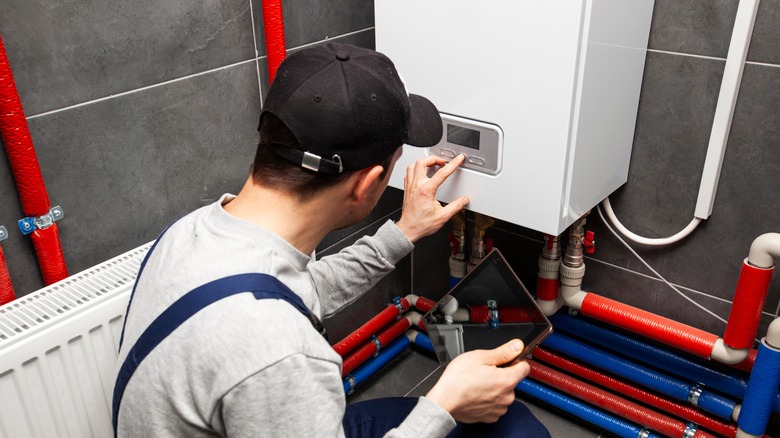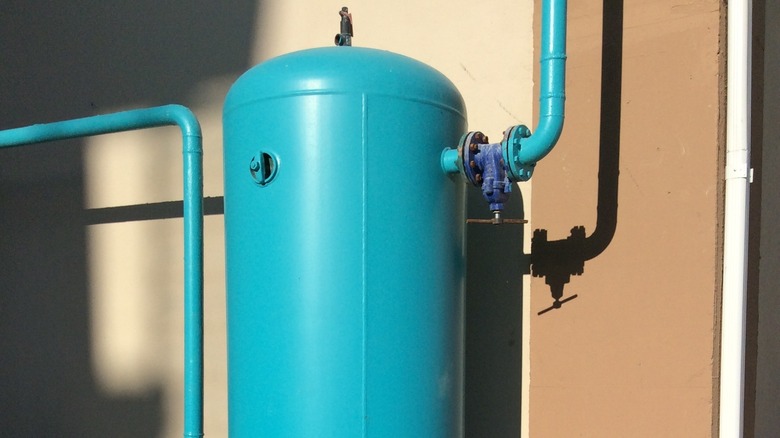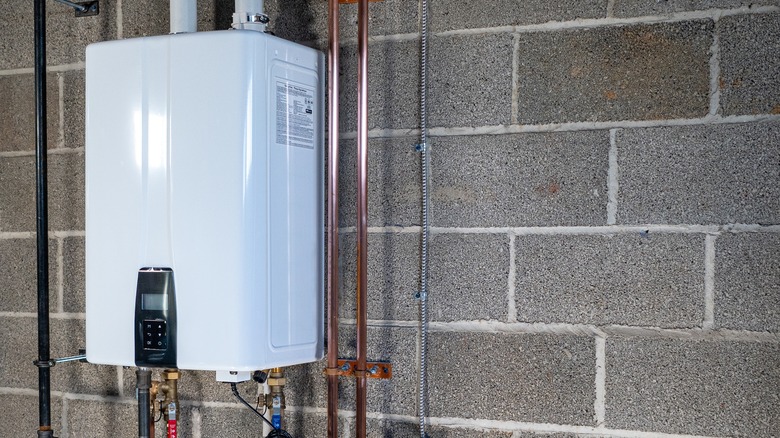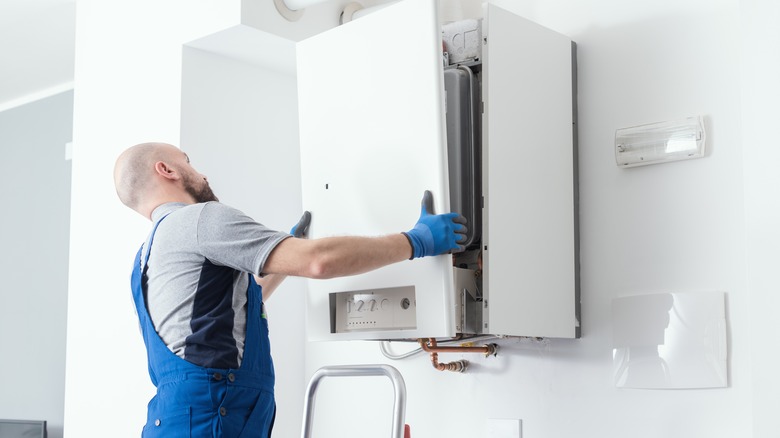How Much Should You Spend On A New Electric Water Heater?
Your home's water heater helps make modern life possible. It's certainly worth its price, but at the same time, it will do the same job even if you find a way to pay less for it by installing a new unit with modern energy-saving technology. On the other hand, it's a large, ungainly piece of machinery that requires a professional to install (you need a permit), so there's plenty of motivation to make the one you have last, as well. Buying a new water heater often involves weighing the trade-off between the expense of having a new system installed and the savings that new system will yield over the life of the unit.
Water heaters vary in their power source, their size, their cost, and their lifespans — it's a fairly broad subject, so we'll be sticking to electric models for this discussion. Electric water heaters are cheaper to buy, run more efficiently, and last longer. They also need no pilot light. However, they are more expensive to run and, in general, do not heat water as fast as gas-powered models.
Within the realm of electric water heaters, there are tank models, tankless models, and the newest development, the hybrid water heater. We'll review the technology of each, and the pricing. One caveat about price, though: For each type of water heater, the cost range (price + installation fees) will vary significantly depending on your region and other factors, so make sure you get more than one estimate in your area before you commit. (Our pricing is the average of five prominent home-improvement websites and hardware retailers.)
Tank models
A tank model water heater is probably what you think of when you think "water heater." They've been around for about a hundred years, making suburbia comfortable, but the gas-powered units came well before electric tank water heaters. The tank type of heater is clearly less efficient than a tankless on-demand system. This is because it is always on and keeping water hot in case you need it, and all the surface area of that large tank leaks the heat created into the air around the tank. Additionally, a tank model has a significantly shorter lifespan than a tankless model (8-12 years, as opposed to around 20 years for a tankless model). It does have the advantage of working better in cold climates than a tankless heater. And the cost for most people will be less to install a tank system, since your house probably already has one, whereas a tankless model will require new electric lines to be installed.
A key factor affecting the price of tank water heaters is the tank size, but if you have a large family or multiple bathrooms, a larger tank is necessary. (A typical tank holds 50 gallons.) The price range for a tank heater, plus installation, runs in a range from $924 to $2,198. That wide range is caused by multiple factors, including labor costs, permits required, tank size, and whether any new gas lines need to be run.
Tankless models
Tankless water heaters are a recent development relative to the hot-water tank, and they bring with them several advantages. For instance, their larger price tag will be more than offset by the energy savings they provide over the lifespan of the unit. And speaking of lifespans, a tankless water heater will last all of 20 years, yielding savings each year over a tank model. They are much smaller than a tank model as well, which not only saves space, but also allows you to install the unit in more locations than just your basement, which is pretty much the only place you can fit a tank model.
Tankless water heaters are not perfect, though. The upfront cost of installing not only the tankless heater, but the extra electric line that will likely be necessary to operate it, is significant. You must also consider your local climate — tankless models do not function as well where it gets very cold in the winter. Repairs, if necessary, will also cost more for a tankless heater, but comparing the costs over the long run still favors the tankless water heater. Assuming your climate allows for it, the national average cost to have a tankless water heater installed runs from $1,450 to $3,975. This higher cost can be attributed to three factors: the higher cost of the heater itself, the higher cost of installing newer technology, and the necessity of running a new 220-volt electric line.
Hybrid models
Hybrid models, as the name suggests, strive to combine the best of tank and tankless water heaters. They do this by employing two modes of operation, one for normal usage and one for high demand. During normal operation, the hybrid heater maintains a tank of hot water (like a tank model) that heats water with a heat pump that draws heat from the surrounding air. For times of high demand, the hybrid also includes a heating coil to produce hot water on demand. This hybrid adaptability allows the hybrid to operate at two to three times the efficiency of a tank model. Home efficiency enthusiasts in New England or Minnesota might be disappointed, however, because hybrid units are especially suited to warm climates, and will not be nearly as efficient if asked to perform in cold weather.
Before you decide which type of heater is right for you, check your local utility rates. If electricity is significantly more expensive than gas in your area, that is another consideration to take into account when you calculate the savings an electric water heater might (or might not) give you, depending on where you live. The national average for having a hybrid water heater installed runs from $1,470 to $3,820.



